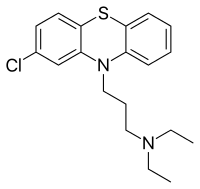Chlorproethazine
 | |
| Names | |
|---|---|
| IUPAC name
3-(2-chlorophenothiazin-10-yl)-N,N-diethylpropan-1-amine | |
| Identifiers | |
| 84-01-5 4611-02-3 | |
| 3D model (Jmol) | Interactive image |
| ChEMBL | ChEMBL2105938 |
| ChemSpider | 59173 |
| ECHA InfoCard | 100.001.373 |
| KEGG | D07308 |
| PubChem | 65750 65750 |
| UNII | 960NX27Z07 |
| |
| |
| Properties | |
| C19H23ClN2S | |
| Molar mass | 346.91732 g/mol |
| Pharmacology | |
| N05AA07 (WHO) | |
| Except where otherwise noted, data are given for materials in their standard state (at 25 °C [77 °F], 100 kPa). | |
| | |
| Infobox references | |
Chlorproethazine is an antipsychotic.
Synthesis
Chlorproethazine can be synthesized from a diphenylsulfide derivative. The general scheme is sufficiently flexible to permit the interchange of the order of some of the steps.

Thus alkylation of aniline thioether () with 3-chloro-1-diethylaminopropane leads to the intermediate (). Ring closure as above by nucleophilic aromatic displacement leads to the antipsychotic drug chlorproethazine.[1]
References
- ↑ Buisson, P.; Gailliot, P.; 1956, U.S. Patent 2,769,002
This article is issued from Wikipedia - version of the 12/11/2015. The text is available under the Creative Commons Attribution/Share Alike but additional terms may apply for the media files.